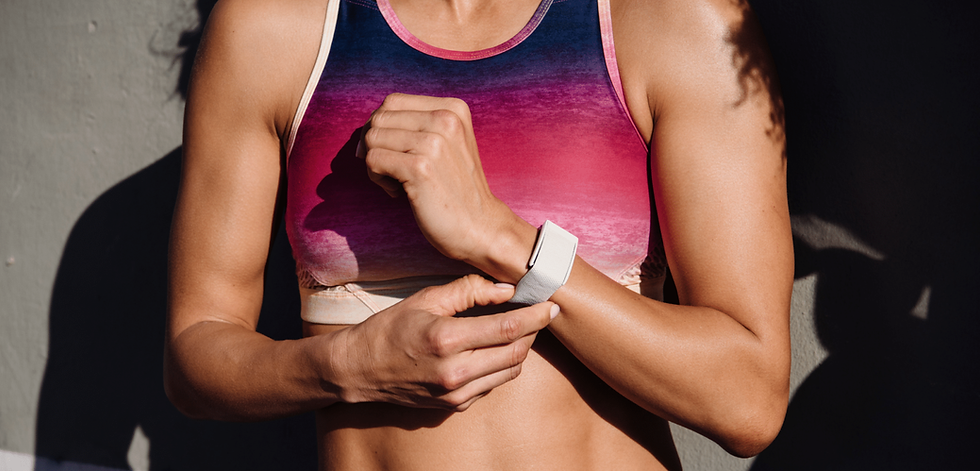Boost Your Positive Body Image
- Kassandra Hobart
- Aug 19, 2020
- 3 min read
Updated: Jun 27, 2023

Positive body image starts with accepting where you are right now. It’s healthy to have goals to reach towards, but in order to appreciate those soon-to-be accomplishments, we must love who we are right now. If we don’t love who we are now, we aren’t going to love a 5-pound-lighter version of ourselves. It’s rooted deeper than that.
Your body image is primarily shaped by your self-talk. When you look in the mirror, what type of thoughts come to mind? Are they positive? Negative? It can be easy to fall into the spiraling negative self-talk.
The good news is, you have control over that voice in your head and can start reshaping it at any moment. Here’s a great tool to practice positive self-talk and strengthen your inner voice: Wake up in the morning and reflect on 3 things you love about your body. The trick is to come up with 3 new things each morning for the entire week. Challenge yourself to continue this exercise for 4 weeks and watch the self-talk evolve.
For many of us, a positive body image plays a significant role in contributing to our overall mental health. The right nutrition, exercise and sleep are all key factors as well.
NUTRITION AND MENTAL HEALTH: WHAT CAN I EAT TO IMPROVE IT?
Believe it or not, stress is mineral expensive on the body. Zinc, magnesium, and calcium are all utilized by the nervous system for healthy cognition. Prolonged periods of stress may deplete these minerals overtime. Adding in potent, whole-food forms of these minerals can improve your mental health, calmness, and focus.
Zinc is essential for protein structure and function, especially in the brain. It plays a vital role in glutamatergic neurons. Magnesium is important for metabolic reactions, namely the production and use of ATP (our body’s energy currency). Calcium is a signaling molecule on which many nerve processes are dependent.
Lastly, proper hydration gives our bodies the ability to maintain the right water/mineral balance.
Zinc sources: Brazil Nuts, Pecans, Pumpkin Seed, Ginger Root and Black Pepper Magnesium sources: Mushrooms, Spinach, Kale, and most Legumes Calcium sources: Broccoli (cooked), Yogurt, Collard Greens (cooked),Turnip Greens (cooked)
EXERCISE FOR MENTAL HEALTH: DOES IT BENEFIT?
We know exercise keeps our tissues and muscles strong, but it also impacts our mental health. Exercise increases our brain health by the secretion of neurotransmitters, chemical messengers, endorphins, and peptide hormones. These messengers and hormones help us thrive mentally and emotionally.
In particular, dopamine leads to the regulation of learning, working, and emotional cognition.
Noradrenaline balances memory and cognitive function.
Serotonin affects the hypothalamus control of pituitary secretions, circadian rhythm, eating habits and melatonin production (Lin & Kuo, 2013).
Endorphins create pain relief and reduce anxiety.
All of this is going on while you work out! Whether you choose to go for a walk, play tennis, CrossFit, or hot yoga, moving around will help your mental health the rest of the day.
WHOOP, SLEEP, AND MENTAL HEALTH
WHOOP Sleep performance metrics give great insight to mental wellness and clarity. Among other things, sleep is a proven memory aid. Research shows that sleep prior to studying makes space for new material. Additionally, sleeping after studying helps prevent forgetting the new information (Mazza, et al., 2016).
While you are asleep, your body restores and repairs the brain, which facilitates the recalibration and healthy function of biological systems. It also allows for detoxification. Using WHOOP to quantify your REM, deep sleep, light sleep and awake phases throughout the night will help gauge how well your brain is repairing. This data lets you understand the strengths and weaknesses of your sleep and how improving your sleep hygiene will ultimately benefit your recovery and mental health the next day.
If you want to try out a FREE month (strap included), head over to the WHOOP affiliate page here.
Remember, wherever you are on your wellness journey, be proud of your current self. Embrace and love who you are today. Cultivate a positive internal dialogue, and witness the transformative power it holds. Unleash your potential for positive body image, nourishment, exercise, and mental well-being.
Check out my 1-1 coaching services tailored to support your needs and help you reach your goals
References
Nutritional Therapy Association. (2019). Basics of Nutrition Student Guide. The Basics of Nutrition. Retrieved from https://nta.brightspace.com/d2l/le/content/10063/Home.
Shiroya, Y., & Minato, K. (2007). Beneficial effects of physical exercise on the exocrine pancreas. The Journal of Sports Medicine and Physical Fitness, 307–313.
Lin, T.-W., & Kuo, Y.-M. (2013). Exercise Benefits Brain Function: The Monoamine Connection. Brain Sciences, 3(1): 39–53.








Comments